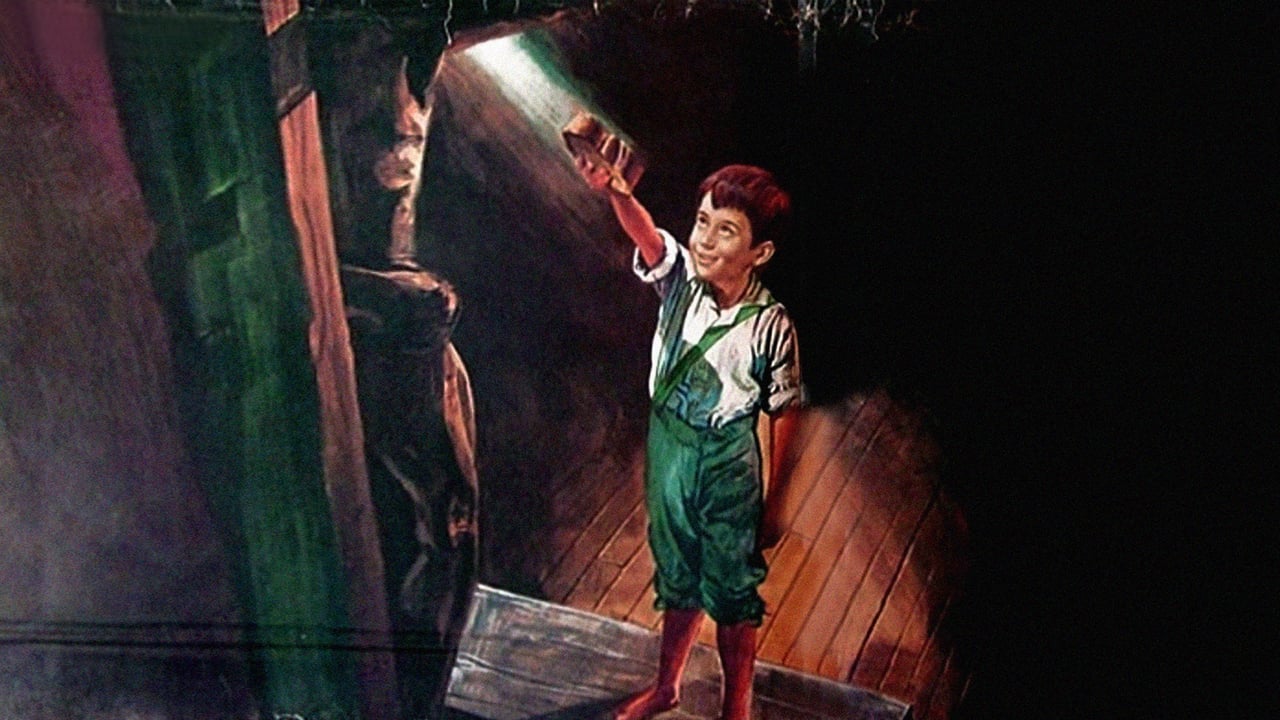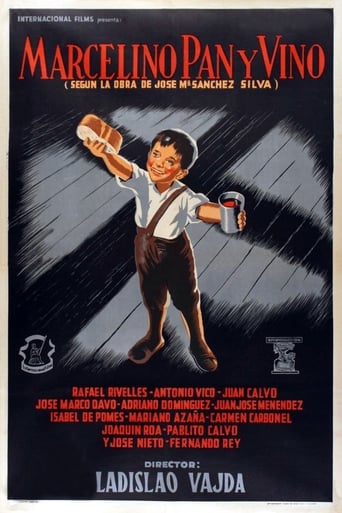

"Every child comes with the message that God is not yet discouraged of man." (Rabindranath Tagore) "We worry about what a child will become tomorrow, yet we forget that he is someone today." (Stacia Tauscher)I have selected two quotes which, at first sight, have little to do with the film. However, when we look deeper at this Spanish classic, the 1955 winner at Cannes and Berlin festivals, we are led to draw a conclusion: it's a movie about a CHILD, a friend of God who, by being fully himself, did not have to become mature in order to address adults and enrapture them with awe and beauty. The thing that has touched me most in this religious classic is its simplicity. A religious theme depicted in movies may absorb different manifestations of spirituality. You can preach something and you make others hear powerful slogans. But conveying values without love has occurred barely useful. Instead, you can address hearts and you make others feel it so intensely that no additional explanations or lectures are necessary. Simplicity is something that touches various people and, meanwhile, something paradoxical: we own it as innate and yet, we lose it somewhere forgetting that this simplicity of life can constantly renew us. Where can we find it more than in such an ingenious, partly naive yet touching story about a child? THE MIRACLE OF MARCELINO (1955) written by Jose Maria Sanchez Silva and directed by Ladislao Vajda is a movie of such influence. The opening sequence is marked by crowds of people who head for a town located in the picturesque landscape of Spain. One monk (Fernando Rey), however, chooses the opposite direction in his journey because he is going to visit an ill child. This is a festival of Marcelino, his feast day which makes so many people celebrate. "Do you know who Marcelino was?" becomes a question addressed to the child in her bed and to viewers in their seats alike. He will be our little protagonist - an orphan boy with such a sweet sounding name who was abandoned as a baby at the gate of a monastery and looked after by twelve Franciscan monks. The flashback brings us to the 19th century Spain and its unique story. Is it a legend? an adventure? a fairy tale or a miracle? As people helped brethren rebuild the monastery, God helps them tackle the dilemma of what future to 'invest' for a crying baby at the gate. Although there are some people who would adopt the boy, including the mayor of the town, brethren know what it means to be good (note the scene at a blacksmith's). They decide to keep him at the monastery as the thirteenth one among them and baptize him Marcelino. From this day on, a great adventure begins for all of them, an adventure filled with the supernatural, awesome experience...The film beautifully handles the core idea of a child that has a spiritual power to change people around him. Many religions stress the aspect that even little children may achieve the heights of spirituality. 5 year old Marcelino (Pablito Calvo) is such a sympathetic protagonist because he owns all childlike characteristics. When he learns, he is curious, when he prays, he is joyful, when he plays, he forgets about the world. There is a lovely scene that presents his everyday activities through a song. At the crucial moment of the film, he shows no fear - he knows who is talking to him. Yet, how can he be afraid of a Friend? Let me highlight one psychological aspect.Although Marcelino seems to have much fun in his everyday life, there is one dream that absorbs him: MOTHER. The little boy is among twelve men but he has no mum. When encountering a woman (Manuel's mother), he is lifted up. His eyes sparkle at once and he imagines the bliss of being in Manuel's shoes, bliss of having a mother (mind you the meaningful name, Manuel, in the course of later events). He immediately creates a friend in his mind whom he never meets. He plays with him, he talks to him...as long as it occurs that there is Someone who can fill this need for true friendship in his little heart. This aspect is important since there have been many critical views that religious films barely carry any psychological development. MARCELINO proves otherwise.Fantasy blends with reality, mysteries with facts and a legend with a historical background. That is also what makes this film so captivating. The scene when he climbs the 'forbidden staircase' and discovers the attic is one of the best moments in the film. Each single detail plays a role in the inner experience, explains a lot: near the stairs, we read the excerpt from Psalm 33 "Humiles Spiritu Salvabit" (God will save the humble of spirit); the close-up of Christ's hand, though considerably influenced by the cinema style of the period, supplies the moment with mystery and piety. HUMOR: Brethren's behaviors and Marcelino's tricks draw our attention and amuse us. One of the most hilarious moments are the missing slices of bread. Moreover, the town sequence offers some moments of laughter. At the same time, the artistic pluses are executed in cinematography and music. But who deserves the credit for being the best Marcelino on screen is PABLITO CALVO. He gives a powerful performance skillfully avoiding the danger of shallow sweetness. His character moves us as a saint child but still a CHILD. Note the subtlety and mystery of the scenes when Marcelino talks to Jesus. We see the boy's face marked by various feelings: from surprise and a little confusion to confidence and peaceful communion.MARCELINO PAN Y VINO is one of the most beautiful religious films ever made, a religious classic that you may watch with heartfelt attitude. Glorious simplicity where 'the small' equal to 'the greatest' in humanity.
... View MoreI don't know and never knew many religious films, but despite my lack of knowledge on this sort of films, I can say that "Marcelino pan y vino" is a very good movie."Marcelino pan y vino" is one of those movies that conquers our hearts for its simplicity. It proves that it's possible to make great movies through a simple story. This is a beautiful but sad story. Simple but unpredictable and absolutely charming. Simple yet with a particular magical touch. Perhaps a sweet, innocent, heartwarming and emotional story? Of course! This movie is a great mix of emotions. Not to mention that the ending is completely unforgettable. Yes, it is that memorable. The soundtrack by Pablo Sorozábal is powerful and combines perfectly with the movie's nature.Although this movie is also known as "The Miracle of Marcelino", its title means "Marcelino bread and wine"."Marcelino pan y vino" is a Spanish film, beautifully directed by Ladislao Vajda. Let's be very, very frank: this is really one of the best foreign movies of all time. Luigi Comencini directed a remake of this in 1991 under the title "Marcellino" but I never saw that one.The actors are all great, but cute little Pablito Calvo steals the show as the title character, Marcelino. And those eyes of his are so expressive!This should definitely be on Top 250.
... View MoreFirst of all I'm not religious. The first time I saw it as a child I didn't really think about religion and stuff like that. My grandmother, Catholic, recorded this show when it was on the television so I could watch it. And boy, it truly is a moving movie. I did cry, and I still do when I see the last part of the movie. Yet it's not a sad movie. I cry because it is so beautiful that Marcelino gets what he wants and therefore has to leave this world. I still do not believe in stuff like that, but it would be great if it were all true.Why do I rate this one 10 out of 10? Because it is beautiful and it sticks. I know every single thing that happens in this movie, even though it has been 10 years since I've last seen this movie. Unlike some of the violent, graphic movies like Pulp Fiction and Boondock Saints (which are great) this one is great without being violent nor graphic. True classic. Amazing. Masterpiece.I'd love to get this one on DVD sometime in the near future.
... View MoreIt doesn't happens every day to be able to witness such an evil blend of catholic propaganda, hypocrisy, rhetoric, moralism, illness, schizogenic behavioral models, ignorance, superstition, prejudice, psychotic self-isolation and self-lesion-ism. This is of course a "must see".This precious fascist document portrays reality in such a distant way from the daily reality of that age that it can be compared, in some ways, to the propaganda-documentaries about alchool during American prohibitionism... with the difference that people would now laugh at that blatant manipulation of reality because they now achieved some higher consciousness about freedom (at least in their drinking habits) So we can see this movie is still "believed" probably by those who had no/little achievement of consciousness about mythologies and spirituality. Conservative ideologists, religious fanatics, nostalgics enclosed and suspended in their freezed bubble of childhood... they will probably all find it a "good" movie... and this tells us that the movie works, in the end, on people by thematic selection of their mind problems rather than offering an human and universal experience based on our common nature.My hope for a healthy humankind vanishes when I'm thinking at this kind of movies. When I'm thinking at the number of people who claimed to like this movie... I feel like the doom of mankind is going to be much worse than "just" total illness.
... View More